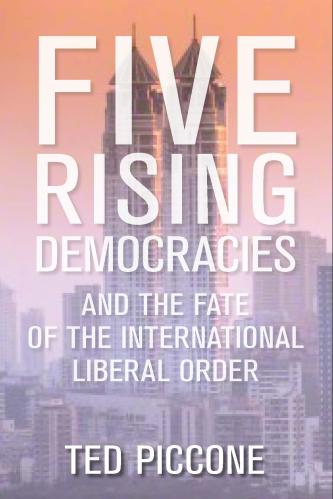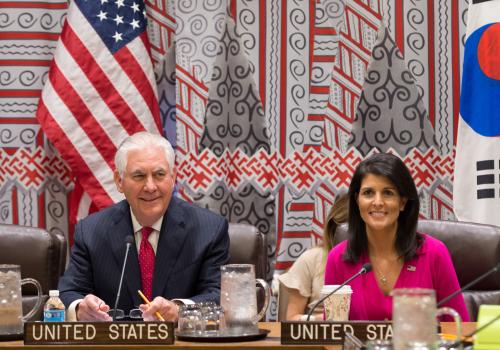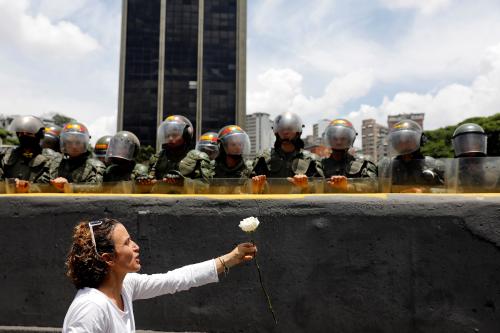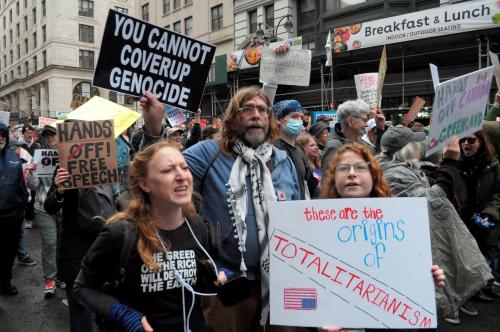There should be little debate that promoting respect for human rights around the world is in the vital national security interests of the United States. Its greatest threats emanate from places where human rights and democratic governance are weak to nonexistent. Think North Korea, Iran, Russia, China, and Afghanistan.
But there are credible arguments and debates over how the United States, for now the world’s most powerful nation, should protect human rights. The best answer is that the United States should address the glaring gaps in respect for human rights in two ways: by living up to its own principles at home, and by using its considerable leverage—with its democratic allies—to cajole other governments to abide by the universal norms they all have adopted since the end of World War II. The Trump administration has demonstrated since its start a failure to do either.
Secretary of State Mike Pompeo and U.S. Ambassador to the U.N. Nikki Haley’s scathing, though predictable, critique of the United Nations’ main body for promoting and defending human rights is yet further evidence that this administration has no real interest in doing the hard labor required to be a leader on human rights. Instead, it prefers to retreat from global leadership on this and a host of other key issues in order to resurrect a narrow and ultimately self-defeating definition of national sovereignty. “[W]hen organizations undermine our national interests and our allies, we will not be complicit,” Secretary Pompeo declared when he announced the decision to withdraw from the U.N. Human Rights Council. “When they seek to infringe on our national sovereignty, we will not be silent.”
This telling remark illustrates that this administration’s North Star is toward a nostalgic past in which states had greater independence from international laws and multilateral diplomacy. Its calculation is that the United States is better able to protect itself from the world’s challenges by acting unilaterally first, and with others only if it must. This turns on its head the longstanding consensus that Washington should work with others to secure peace, and alone if it must.
The U.N. Human Rights Council is a good example of how these dynamics play out amid the realities of the post-Cold War international liberal order. Born of a recognition that the U.N. needed to move beyond the East-West divide that had hampered effective progress on human rights, states agreed in 2006 both to widen and deepen the agenda for cooperation. The new council would continue to examine critical country-specific situations while establishing a new process for scrutinizing the human rights records of every state, including the United States.
In practice, this has meant strong action investigating and condemning human rights abuses by some of the worst violators of human rights—Syria, Iran, North Korea, Myanmar, Sudan, Cambodia, Belarus, Burundi, and Eritrea, to name a few. On the downside, this also meant that Israel and its harsh treatment of Palestinians would get exaggerated attention on the agenda, a result of the U.S. withdrawal from the Council’s early days when then-Ambassador John Bolton railed against the body’s imperfections and left Israel out to dry. It has also led to greater criticism of this administration’s obvious human rights transgressions, including most recently the High Commissioner’s shaming of its policies of separating families on the border.
The Council, despite its checkered membership, also decided to expand the breadth of human rights issues on its agenda, encompassing such pressing matters as freedom of association and of the internet, protecting LGBTI persons from violence and discrimination, and condemning violence based on one’s religious beliefs. It did so through active U.S. leadership, including dispatching top diplomatic experts and working closely with civil society to build the coalitions necessary to get things done in multilateral bodies.
This administration has neither the strategic vision nor the political will to build on this record of achievement. Instead it has devoted its energies to complaining about what it considers the fatal flaws of what is an inherent feature of virtually every component of today’s international system. This includes the fact that the Human Rights Council membership looks like the rest of the U.N.—about one-third of its members are authoritarian states bent on undermining the international human rights system, one-third are liberal democratic states committed to strengthening international norms and practices, and one-third are persuadable swing states that have joined the United States repeatedly to hold states to account for their imperfect human rights performance.
Taking the administration’s argument about membership to its logical conclusion, the United States should withdraw from the U.N. Security Council when its members—like Russia—oppose the United States on matters like chemical weapons in Syria, or on Israel’s disproportionate attacks against civilians in Gaza. It probably won’t do that, in part because it has veto rights. But don’t be surprised if we see a return to the harsher anti-U.N. arguments of the Bush era—led by now-National Security Advisor Bolton—that the United Nations is more trouble than it’s worth because it restrains unabashed U.S. power.
In any event, the U.S. withdrawal from the Human Rights Council is the latest demonstration that human rights, in this administration’s view, are not important enough to wage the fight needed to confront the real enemies of human rights around the world. Such states—including China, Cuba, Venezuela, Egypt, and Russia—are no doubt enjoying a rousing toast as they watch Washington back out of yet another international effort to hold them accountable.
Such a result, however, is precisely this administration’s goal: Weaken institutions not to its liking, abandon them if they do not comply with its demands, pick fights with democratic allies while cutting deals with autocrats, and go it alone with little regard of the costs to U.S. interests. It also has the added benefit, in administration officials’ minds, of absolving the administration from pretending to lead by its own example on human rights.
The Brookings Institution is committed to quality, independence, and impact.
We are supported by a diverse array of funders. In line with our values and policies, each Brookings publication represents the sole views of its author(s).








Commentary
U.S. withdrawal from U.N. Human Rights Council is “America alone”
June 20, 2018